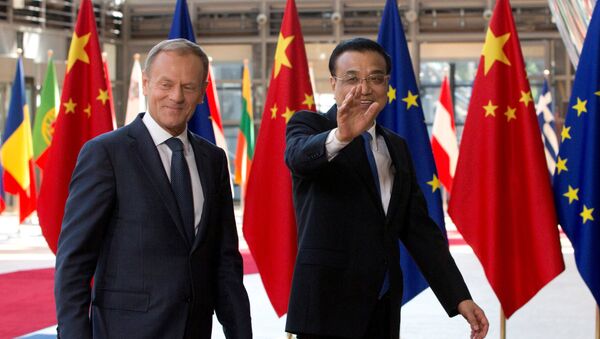EREF is the federation of national renewable energy associations from the EU member states.
Since 2016, China remains a worldwide leader in the renewable energy production, according to International Renewable Energy Agency's (IRENA's) Renewable Energy Statistics 2018 yearbook. It produces more renewable energy than all European countries combined.
READ MORE: China Launches Anti-Dumping Probe Against Steel Imports From EU, Japan, S Korea
"In the past, it was Europe leading. It was several European countries — Germany, Denmark, Spain and some others. Because they had very good policy frameworks. But then, when it was no longer new, and existing utilities felt that this might be a competition for them, there was a political debate in Europe that has led to somehow slowing down the transformation to renewable energy," Hinrichs-Rahlwes said on the sidelines of the IRENA Innovation Week in Bonn.
China, on the other hand, has a constantly growing energy need, a grave air pollution problem, and nuclear plants is not a solution because of high prices and safety risks, he explained.
"That is why they have started to invest more and more in renewable energy… Wind and solar energy is the least-cost solution, that is why they are doing it," Hinrichs-Rahlwes said.
According to the January 2018 report by the Institute for Energy Economics and Financial Analysis (IEEFA), China’s total investment in clean-energy projects in 2017 stood at over $44 billion — a significant growth from $32 billion in 2016.
"Europe could retake the lead, but it would depend on some policy decisions. Europe is now deciding on the framework for 2030… At present, it looks like the targets are slightly better than what they were at the beginning of the process because the commission only proposed 27 percent instead of 32 percent," Hinrichs-Rahlwes said.
READ MORE: EU Urges US, Russia and China to Avoid Trade Wars, Speed Up WTO Reform
The EREF vice-president explained that Europe needs "a lot more installation" in wind and solar and biomass energy generation. This can only be achieved if administrative barriers are removed, allowing the new market players to come to the game.
"If you listen to what politicians say — energy commissioner, climate commissioner, all national ministers — they all commit to the Paris Agreement, they all commit to the energy transition. But if you ask how you will do it, they say: yes, it will happen and let the markets do it," Hinrichs-Rahlwes said.
He noted that he was not optimistic about the issue.
"I am not too optimistic that they will really deliver on it… So far the framework is not clear enough, and this is why I think it will be quiet difficult to really come on the fast track again," he added, noting, however, that a drastic cost reduction of solar panels and storage technologies "could be a strong game changer" in future.
The Innovation Week is held in Bonn September 5-7 and brings together officials, producers, businesses to focus on the issue of renewables.
The views and opinions expressed by the speaker do not necessarily reflect those of Sputnik.


